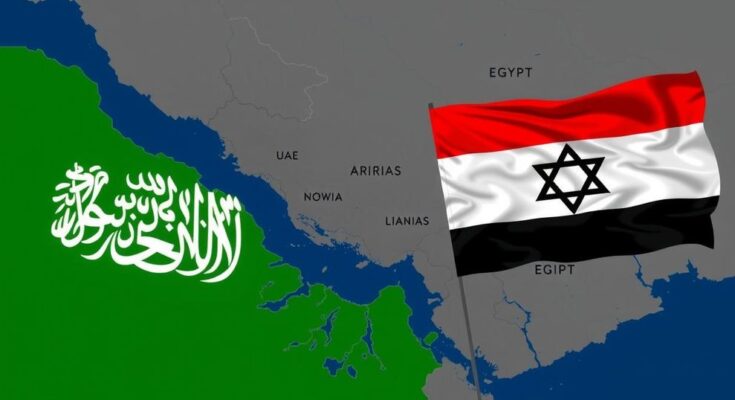Saudi Arabia, UAE, and Egypt’s recent reactions to Israel’s military action against Iran reflect a significant shift from outright condemnation to measured responses emphasizing diplomacy, sovereignty, and regional stability. This represents a subtle realignment as these nations navigate their shared interests in countering Iranian expansionism while strategically acknowledging Israel’s role in maintaining regional security.
The intricate geopolitical landscape of the Middle East is undergoing a subtle transformation as Saudi Arabia, the United Arab Emirates (UAE), and Egypt express responses to Israel’s military actions against Iran that reflect a cautious diplomacy. Previous paradigms of vehement denunciations have shifted towards measured statements that reveal a nuanced standoff. While these nations profess support for the Palestinian cause, their recent communications tacitly acknowledge Israel’s strategic role in countering Iranian influence. Rather than issuing unequivocal condemnations against Israel for its military strikes, these states carefully employ language that emphasizes sovereignty, stability, and dialogue. For instance, the UAE condemned the targeting of Iran yet underscored the importance of engagement and adherence to international norms, steering attention toward diplomatic solutions rather than escalating tensions. This mirrors a wider trend of economic and security engagement between the UAE and Israel, particularly following the Abraham Accords. Saudi Arabia, reflecting a similar evolution, referred to Israel’s actions as a violation of sovereignty but tempered this with an emphasis on the broader security concerns facing the region. This reflects a strategic recalibration in Riyadh’s approach towards Israel, revealing an implicit understanding of the necessity of Israel’s security measures against Iranian threats. Egypt offered its own interpretation, expressing concerns about potential regional confrontations and advocating for immediate ceasefires—not solely in terms of Israeli actions, but encompassing broader regional dynamics that jeopardize security. This positions Egypt as a mediator intent on maintaining stability within its borders, emphasizing collective security over individual state accountability. This careful articulation of statements from these nations indicates a significant shift; it suggests a collective regional alignment towards mutual interests in security and stability that may allow for a more tolerant view of Israel’s actions. The prospect of collaboration over confrontation is becoming increasingly nuanced, thus indicating a pragmatic approach aimed at addressing the looming threats from Iran. In essence, the tempered reactions from Saudi Arabia, the UAE, and Egypt signify not merely a departure from past animosities towards Israel but a cautious embrace of combined interests in regional stability—highlighting a potential paradigm shift in Middle Eastern relations.
The geopolitical dynamics in the Middle East have historically been characterized by overt hostility towards Israel, particularly regarding its actions against Iran and Palestinian issues. However, recent developments suggest a transformation wherein certain Arab states are reconsidering their public statements and strategic alignments. The motivations for this shift involve common concerns regarding Iranian expansionism, the pursuit of economic stability, and evolving security threats. The implications of these changes could lead to unprecedented cooperation among traditionally adversarial neighbors, rooted in a common understanding of regional priorities and threats.
In conclusion, the recent statements from Saudi Arabia, the UAE, and Egypt characterized by a lack of direct condemnation of Israel following its military actions against Iran underscore a profound shift in the geopolitical narrative of the region. These countries, while still vocal about their support for Palestine, increasingly prioritize the security implications of Iranian influence and the potential role of Israel as a stabilizing entity in a tumultuous landscape. This nuanced approach signifies a growing recognition of shared interests which may pave the way for a different kind of inter-Arab and Arab-Israeli relations moving forward.
Original Source: www.jpost.com




